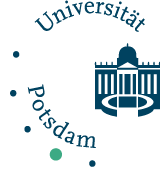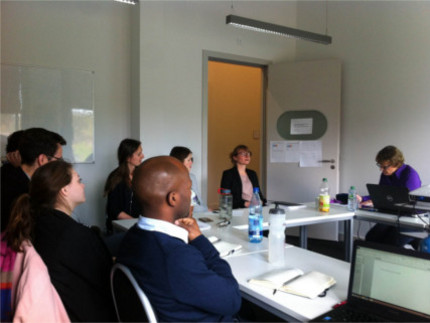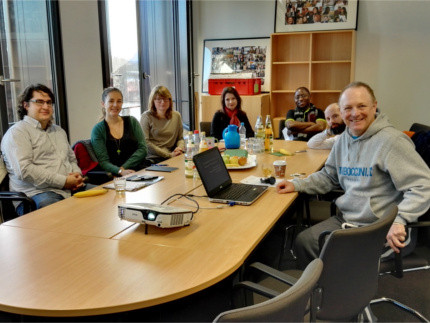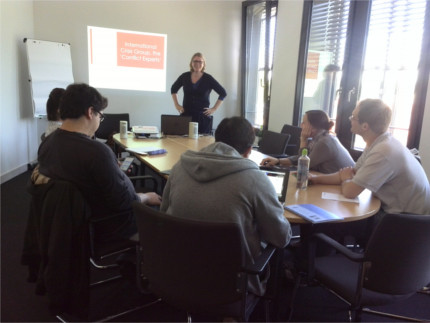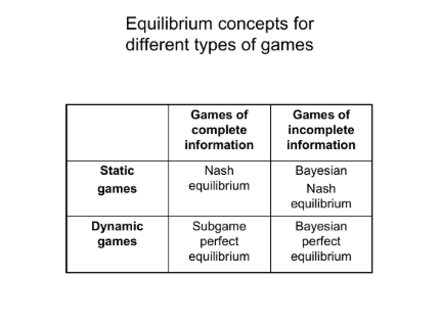Methods workshop on "Translation" with Prof. Barbara Czarniawska
Prof. Barbara Czarniawskafrom the University of Gothenburgh (Sweden), best known for her highly influential research on the travel of ideas and translation, was a guest researcher at WIPCAD during the week of 25 April. Her input was much appreciated and during her stay she was in high demand.
She delivered the first WIPCAD lecture of the summer semester on 27 April 2017 on "University Fashions" and advised doctoral researchers on their individual projects in one-to-one appointments. In addition, she offered a 90-minutes methods workshop. At the example of three different studies, the group of 14 participants learnt about three ways in which to study translation of ideas and practices:
1. To be in a place where a global idea is translated into practices;
2. following translations of documents and objects;
3. following objects and quasi objects themselves.
Workshop on “Transformative Action Learning” with Prof. Robert Kramer
On 16 March 2016, Prof. Robert Kramer (International Chair of Public Leadership, National University of Public Service, Budapest, Hungary) held a workshop on transformative action learning within the framework of WIPCAD and the Master of Public Management (MPM).
Twenty MPM and WIPCAD students and young researchers participated at the live transformative action learning session. Robert Kramer invited workshop participants to question their own mindsets as well as the basic taken-for-granted assumptions applying a case demonstration in a "fishbowl" format.
Workshop on “How to build an academic career” with Prof. Stephen Osborne
On 28 January 2016, WIPCAD visiting researcher Prof. Stephen Osborne from the University of Edinburgh held a workshop open to WIPCAD doctoral fellows as well as to students of the Master of Public Management (MPM) program at the University of Potsdam. While Prof. Osborne presented his research on “The SERVICE framework - towards resilient and sustainable public services in the twenty first century" during the previous day’s WIPCAD Lecture Series, the emphasis of the workshop lay on sharing his experience as an academic researcher.
Five doctoral fellows in various phases of their dissertation project as well as one MPM student had the opportunity to engage with the founder and editor of the leading journal Public Management Review (PMR). After gaining a brief overview of the participants’ profile and research topics, Prof. Osborne introduced his own career track and gave a context to the different steps that lead him to be a professor at one of the World’s Top 20 universities. He for example depicted his way back into academia after having worked as practitioner and compared the opportunities and limitations of management vs. research positions within universities.
Building on this, he gave the participants ten tips for building a good academic career. Major takeaways were the value of serendipity, the importance of building networks and the identification of learning opportunities. Upon request of the participants, Prof. Osborne further elaborated on questions related to publication strategies. He shared his experience as an editor of PMR and discussed the issue of journal ranking. Other topics that were addressed are the benefits of collaborating with senior researchers during the early steps of an academic career, the way to deal with journal rejections and the importance of creating and delineating a field of expertise.
Concluding the workshop, Prof. Osborne welcomed the participants to contact him for advice on matters related to his fields of expertise.
Report by Jennifer Bansard
Workshop on “Urban Challenges and Methods for Institutional Theory” with Renate Meyer
On 19 November 2015, WIPCAD guest researcher Professor Renate Meyer (Vienna University of Economics and Business) invited the WIPCAD doctoral fellows to a workshop on “Challenges for Urban Management and Governance: Open, sustainable, transparent and/or bureaucratic?”. Seven doctoral fellows followed her invitation, out of interest for either urban management or applied institutional theory.
In the workshop, Renate Meyer presented some of her ongoing research projects from the field of urban management: A mixed-methods examination of ‘idea bundles’ which explores how management reforms are less about the spread of single concepts but the diffusion of interconnected and embedded bundles of concepts. Other ongoing projects deconstruct city strategies and admininstrators’ understandings of Open Government with a critical theory approach.
Shifting to the participants’ projects, Renate Meyer asked the attending fellows to locate their dissertations in terms of empirical phenomenon, methodology, theory, and targeted audience. Based on these reflections, Renate Meyer and the fellows tried to assess each projects’ academic contribution and internal fit with regard to phenomenon, method and theory, the project’s fit with the favored publication strategy as well as the fellows’ career ambitions.
In reaction to the participants’ needs, Renate Meyer spent the remainder of the workshop presenting and sharing her experiences with different methods she has successfully used in neo-institutionalist research. The outlined methods included frame analysis from social movement research, correspondence analysis as a structure-reconstructing quantitative method applied to qualitative data, and different forms of semantic network analysis such as co-occurrence and vocabulary analysis.
Concluding the workshop, Renate Meyer offered her assistance in case of practical questions and the WIPCAD doctoral fellows left the workshop brimming with new ideas.
Report by Basanta Thapa
Workshop “International Crisis Group” by Dr. Berit Bliesemann de Guevara
On 17 June 2015, WIPCAD visiting researcher Dr. Berit Bliesemann de Guevara from the Aberystwyth University held a workshop on her research project about the International Crisis Group. The International Crisis Group (ICG), which provides analysis and advocacy for violent conflicts and crises all over the world, has a reputation as an authoritative source of information for international decisionmakers, but has not been studied itself. In their joint project, Dr. Bliesemann and her colleagues undertook a pioneering effort by examining how ICG establishes authority, produces and disseminates knowledge as well as tracing the ICG’s policy impact. (A selection of the project’s findings has been published in a special issue of Third World Quarterly.)
In her workshop, which was open to WIPCAD doctoral fellows as well as students of the Master of Public Management program, Dr. Bliesemann first introduced the ICG and the central research questions of her project. In the interactive part of the workshop, the participants then developed research designs to answer these questions. Finally, Dr. Bliesemann presented the project’s actual approaches to the different questions, comparing them to the research designs sketched in the workshop. This included an overview of her findings, which suggest a critical view of the ICG and a careful reading of its reports.
Report by Basanta Thapa
Guest researcher workshop on “Game Theory” with Prof. Jon Hovi
On 26 April 2015, WIPCAD Guest Researcher Prof. Jon Hovi, Professor, Department of Political Science, University of Oslo, Norway held an introductory workshop on game theory.
Together with his colleague from Potsdam, WIPCAD senior member Prof. Detlef Sprinz, he introduced the main elements of game theory to the WIPCAD doctoral fellows and discussed a template for game-theoretical analysis as well ast the basic concepts (Rationality, Strategy, Subgame, Information set, Pareto optimality).
Furthermore he addressed equilibrium concepts (such as Nash equilibrium, Subgame-perfect equilibrium, and Perfect Bayesian equilibrium) and games of incomplete information (such as Russia’s annexation of Crimea, and Nuclear deterrence during the Cold War).
